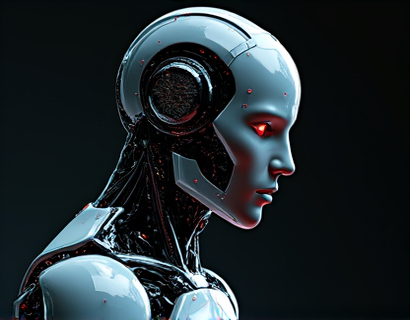AI-Powered Software: Transforming Digital Businesses Through Intelligent Automation and Data Insights for Enhanced Growth and Efficiency
In the rapidly evolving digital landscape, businesses are increasingly turning to AI-powered software to stay competitive and achieve sustainable growth. The integration of artificial intelligence into various business processes has proven to be a game-changer, offering intelligent automation and data-driven insights that enhance decision-making and drive efficiency. This transformation is not just a trend but a necessity for digital businesses aiming to thrive in a market where innovation and adaptability are key.
The core of this transformation lies in the ability of AI-powered software to automate repetitive and time-consuming tasks, freeing up human resources to focus on strategic initiatives. By leveraging machine learning algorithms and advanced analytics, these tools can process vast amounts of data quickly and accurately, providing insights that were previously unattainable. This capability is crucial for businesses seeking to optimize operations, improve customer experiences, and uncover new revenue opportunities.
Intelligent Automation: Streamlining Business Processes
Intelligent automation is at the forefront of this revolution, enabling businesses to automate complex tasks with precision and efficiency. Traditional automation methods often require extensive programming and manual intervention, which can be both time-consuming and error-prone. In contrast, AI-driven automation uses natural language processing, computer vision, and predictive analytics to perform tasks that traditionally required human input.
For instance, in customer service, chatbots powered by AI can handle a wide range of inquiries, from basic support to complex problem-solving, 24/7 without the need for human oversight. This not only reduces operational costs but also enhances customer satisfaction by providing instant and accurate responses. In finance, AI can automate compliance checks, fraud detection, and risk assessment, ensuring that businesses adhere to regulatory standards while minimizing the risk of errors.
In manufacturing, intelligent automation can optimize production lines by predicting equipment failures and scheduling maintenance proactively. This predictive maintenance approach reduces downtime and extends the lifespan of machinery, leading to significant cost savings. Similarly, in supply chain management, AI can optimize inventory levels, forecast demand, and streamline logistics, ensuring that products reach customers efficiently and on time.
Data-Driven Insights: Enhancing Decision-Making
Beyond automation, AI-powered software provides deep data insights that empower businesses to make informed decisions. The ability to analyze large datasets and extract meaningful patterns is invaluable in today's data-driven world. These insights can inform strategic planning, product development, marketing strategies, and more.
For example, e-commerce platforms can use AI to analyze customer behavior, preferences, and purchasing patterns to personalize shopping experiences. By recommending products based on individual preferences, businesses can increase conversion rates and customer loyalty. In the retail sector, AI can analyze sales data to identify trends and opportunities, helping retailers to adjust their inventory and marketing strategies accordingly.
In the healthcare industry, AI-powered analytics can process patient data to identify risk factors, predict disease outbreaks, and personalize treatment plans. This not only improves patient outcomes but also optimizes resource allocation and reduces costs. Similarly, in the financial sector, AI can analyze market trends and economic indicators to make better investment decisions, manage risks, and detect fraudulent activities.
Case Studies: Real-World Applications
Several industries have already embraced AI-powered software to transform their operations and achieve remarkable results. In the logistics sector, a major shipping company implemented an AI-driven system to optimize route planning and load balancing. The result was a 20% reduction in fuel consumption and a significant decrease in delivery times, leading to higher customer satisfaction and lower operational costs.
In the healthcare industry, a leading hospital integrated an AI-powered diagnostic tool that assists doctors in identifying diseases more accurately and quickly. This tool has not only improved diagnostic accuracy but also reduced the time patients spend waiting for results, enhancing the overall patient experience.
In the manufacturing sector, a prominent automotive manufacturer adopted AI for predictive maintenance of their production lines. By predicting equipment failures before they occur, the company has reduced unplanned downtime by 30%, leading to increased productivity and cost savings.
Challenges and Considerations
While the benefits of AI-powered software are undeniable, businesses must also be aware of the challenges and considerations involved in implementing these solutions. One of the primary concerns is data privacy and security. With the increased use of data, ensuring that sensitive information is protected from breaches and misuse is paramount. Businesses must invest in robust security measures and comply with data protection regulations to build trust with customers and stakeholders.
Another challenge is the need for skilled professionals who can develop, maintain, and optimize AI systems. The demand for data scientists, machine learning engineers, and AI specialists is on the rise, and businesses must either invest in training their existing workforce or attract top talent from the market. Additionally, there is a risk of over-reliance on AI, where human judgment and creativity may be overshadowed by algorithmic efficiency. Striking the right balance between automation and human oversight is crucial for sustainable growth.
Future Trends: The Evolving Landscape of AI in Business
The future of AI in business is promising, with ongoing advancements expected to further enhance its capabilities and applications. One area of focus is the development of more explainable AI (XAI) systems, which provide transparency into the decision-making processes of AI models. This is particularly important in industries where accountability and trust are critical, such as finance and healthcare.
Another trend is the integration of AI with other emerging technologies like the Internet of Things (IoT), 5G, and blockchain. These synergies can lead to more interconnected and intelligent systems, enabling real-time data exchange, enhanced security, and more efficient operations. For instance, IoT devices can feed data into AI models, which can then provide actionable insights for smart city management, industrial automation, and more.
Moreover, the rise of low-code and no-code platforms is democratizing AI, allowing businesses of all sizes to leverage these technologies without extensive technical expertise. These platforms provide user-friendly interfaces and pre-built components, making it easier for non-technical users to develop and deploy AI solutions tailored to their specific needs.
Conclusion
The integration of AI-powered software into digital businesses is not just a trend but a fundamental shift in how companies operate and compete. By automating processes and delivering data-driven insights, AI enhances decision-making, improves efficiency, and opens up new growth opportunities. As businesses continue to navigate the complexities of the digital landscape, embracing AI will be essential for staying ahead of the curve and achieving long-term success.











































